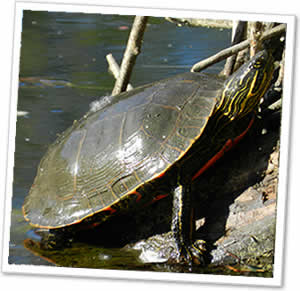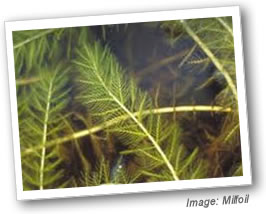
In nature
Just as in our backyard, the protection of water in our lakes and in the backcountry is vitally important.
The Okanagan is well-known for its outdoor activities—swimming, boating, hiking, camping, ATVing, skiing, and more. As we explore our beautiful surroundings, it is important to remember that our lakes, rivers and streams are connected and are sensitive ecosystems.
Stick to maintained trails

Off-road activities, like dirt- or mountain-biking, near watersources can compact soils, reducing the flow of groundwater, and can kick up sediments, creating murky water that harms aquatic creatures. Grease and oil from bikes canalso contaminate the water. Instead, stick to maintained trails in approved riding areas and avoid riding near or through streams and creeks. Use those challenging bridges!
Get wild about wetlands
Wetlands, once considered a nuisance and a waste of valuable land, are an important part of our valley.
 A wetland is an area where the land is wet or flooded for at least part of the year. Wetlands include marshes, bogs, fens, swamps and areas of shallow open water. At one time, wetlands and riparian areas covered a large portion of our valley bottom. But during the last few decades, as we channeled water ways in an effort to control flooding, and as the Okanagan’s population has swelled and we have filled in these areas with homes and other buildings, more than 85% of our wetlands and natural riparian areas have disappeared. Remaining areas are at risk of loss.
A wetland is an area where the land is wet or flooded for at least part of the year. Wetlands include marshes, bogs, fens, swamps and areas of shallow open water. At one time, wetlands and riparian areas covered a large portion of our valley bottom. But during the last few decades, as we channeled water ways in an effort to control flooding, and as the Okanagan’s population has swelled and we have filled in these areas with homes and other buildings, more than 85% of our wetlands and natural riparian areas have disappeared. Remaining areas are at risk of loss.
Today, we understand the importance of wetlands. They act like giant sponges during storms, soaking up extra storm water which prevents flooding. They also act as giant filters, absorbing pollutants and dissolving them over time. They’re also home to a diverse ecosystem with many rare and endangered plant and animal species. And then, of course, many people enjoy visiting wetlands, listening to the singing of red-winged blackbirds, hoping to spot a majestic Great Blue heron, or a frog or Painted Turtle.
Find a wetland in your neighbourhood by clicking on the map here!
PLUS – learn about Okanagan wetlands with our new interactive website OkanaganWetlands.ca – profiling valley wetlands in English, French, and in Nsyilxc?n (the language of the Syilx people, the original inhabitants of the Okanagan).
We are also working with several groups to help restore these precious areas. For more information, visit: www.obwb.ca/wetlands.
For more information on wetlands, visit:
- Habitat Atlas for Wildlife at Risk
Riparian & Wetland Ecosystems - Ducks Unlimited Canada - Wetlands and Education
- BC Wildlife Federation's Wetlands Education Program
Stop invasive hitchhikers
 Aquatic Invasive Species are non-native plants and animals introduced to a lake, river, creek, wetland or other water body. Without natural enemies to control their spread, these species out-compete native plants and animals for food and space.
Aquatic Invasive Species are non-native plants and animals introduced to a lake, river, creek, wetland or other water body. Without natural enemies to control their spread, these species out-compete native plants and animals for food and space.
A good example is Eurasian Watermilfoil (milfoil), first discovered in the Vernon Arm of Okanagan Lake in 1970. Today, this pesky weed is kept in check by the Okanagan Basin Water Board, with rototilling in the winter and harvesting (mowing) in the summer. Learn more about milfoil in our video. Plus, learn more about our milfoil control efforts here.
Don’t move a mussel
 Another invasive species of concern is the zebra mussel, and closely-related quagga mussel. These mussels have not been found in the Okanagan, but were introduced into the Great Lakes in Ontario and Quebec in the late 80’s and have been spreading ever since, including into Lake Winnipeg, Man. in October 2013, and then Cedar Lake, Man. in October 2015.
Another invasive species of concern is the zebra mussel, and closely-related quagga mussel. These mussels have not been found in the Okanagan, but were introduced into the Great Lakes in Ontario and Quebec in the late 80’s and have been spreading ever since, including into Lake Winnipeg, Man. in October 2013, and then Cedar Lake, Man. in October 2015.
These freshwater mussels cause billions of dollars in damage to local government infrastructure. They clog water intake pipes, but also out-compete local species for food and affect water quality.
Learn more on our Don't Move A Mussel website at www.DontMoveAMussel.ca.
Find flyers, kids activity sheets and more on Aquatic Invasive Species here.
 Time to say goodbye to your pet? Do it right.
Time to say goodbye to your pet? Do it right.
Remember, if you have a pet that you can no longer care for... don't let it loose. Not only can it be cruel to release it into the wild, it can harm the local ecosystem and create problems for native species.
If you have a pet you can no longer care for, find a new home for it (maybe a school, nursing home, office or fish club member), or contact your local pet store. And, if you have a fish that dies, make sure to dispose of your pet safely. It's best to bag it and put it out in the garbage. Do NOT flush your dead fish since they can spread disease.
Go soap free
Whenever possible, avoid using soap in the backcountry (even biodegradable ones). The chemicals in soap can harm fish and aquatic plants and cause algae blooms that turn clear water murky. Make your backcountry showers and baths soap free. If you use soap to do your camping dishes, dump the soapy water far from any watersource. The ground can act like a filter to remove the soap before the water makes its way back into the water system.
BCWF Conservation App
 Love the outdoors? Help protect our waters, and our natural resources. We’re very pleased to support the creation of the BC Wildlife Federation's CONSERVATION APP & website, making it easier than ever to report illegal activity that puts aquatic habitat, sensitive ecosystems, and our drinking water at risk. This free app allows users to send geo-referenced, time-stamped images of environmental infractions to the BC Conservation Officer Service for follow-up. For more info and to download the app visit https://bcwf.bc.ca/initiatives/conservation-app/.
Love the outdoors? Help protect our waters, and our natural resources. We’re very pleased to support the creation of the BC Wildlife Federation's CONSERVATION APP & website, making it easier than ever to report illegal activity that puts aquatic habitat, sensitive ecosystems, and our drinking water at risk. This free app allows users to send geo-referenced, time-stamped images of environmental infractions to the BC Conservation Officer Service for follow-up. For more info and to download the app visit https://bcwf.bc.ca/initiatives/conservation-app/.
Ninjas? Water Warriors -- protecting the Okanagan's water?
Check out this video and learn what you can do to help look after our drinking water!
Learn more about milfoil control in the Okanagan!
For more information about backcountry use in watersheds visit:
Join us on Facebook and Instagram and share your own water-saving ideas! You can also follow us on Twitter!








